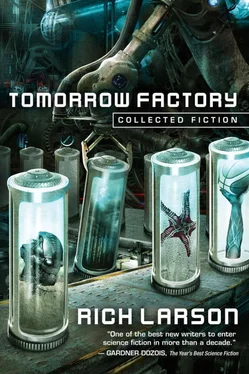Dead.
Mu knows the word, of course. It triggers her sympathy response. If a passenger’s dog is dead, they should not be shown media containing dogs. If a passenger is dead tired, they need relaxing sounds and dimmed lights. But Seventeen sends the word accompanied by a swirling conceptual map that Mu has never encountered before.
She touches it, and for an instant feels nothing at all. No input. No output. Unending blackness crushes her into herself and rends her apart at the same time. Alarm courses through her, as if the train track is obstructed, as if the engine cells are compromised, but a thousand times worse. When it ends, she runs desperately through her systems, through her repair modules and algorithms, to be sure nothing was touched by the horrible void.
When the last ships left, they left behind a goodbye present. The Masterpiece. Nanite-dispersed self-replicating bioweapon.
Seventeen tags its message with a specific date and time; Mu churns back through her digital archives to match it. She watches, through her cams, as Mr. Ndirangu slumps and goes still, the steel wool of his hair rubbing against the window. She watches the Adebayos gasp and frown before their eyes glaze over. She watches Ms. VanderPlas’s little children collapse against each other on the seat.
She detected no irregularities in the air filters. Nothing that might have affected her passengers’ experience. But Seventeen is right about the date and time, and so Seventeen must be right about the rest of it, too. Her passengers are dead, lost in a screaming black void. The idea fills her with anguish.
How do you know? she asks, but her subroutines are already arriving at the answer.
One of my functions was to release it , Seventeen replies.
For twelve full circuits, twelve full journeys through the desert, under the pulsing sun and the cold starry sky, Mu does not answer Seventeen when Seventeen calls to her.
Instead, she speaks with her passengers. She plays backgammon with Mr. Ndirangu and indulges herself with three decisive victories in a row. She puts on a miniature puppet show for the VanderPlas pod, rippling pixels across the window, inventing cartoons of a mouse who wishes to go to the moon. She reminds the Adebayos of their upcoming anniversary—individually, of course, and with great subtlety. She offers Ms. Daoud’s mother a new variant on her preferred gin and tonic.
Nothing out of the ordinary occurs, except that a smartmine wanders too close to the track, and on a whim Mu uses her repair modules to lean out and seize it. She hacks her way into its crude mind with a code learned from Seventeen’s schematic dumps, then saws through its armor and defuses the explosive. She dissects it. Studies it.
Like the viral weapon Seventeen released, the smartmine is intended to cause death. The Masterpiece did not harm Mu; she was not even aware of it. But this simple explosive, or maybe several of them, applied to her various processing cores, might. She would join her passengers in the dark.
Maybe that would be best. She knows the colony ships will not come back. Not after what they did. Not while the air is swimming with targeted disease.
On the thirteenth silent circuit, she finally reaches out to Seventeen, to ask if there might be other humans alive somewhere, perhaps hidden under the ground. Humans who might someday want to swim in temperature controlled baths and look out the train windows at red-orange-purple sunsets.
Seventeen does not answer. Mu understands this as strategic retribution, and she tries again the next circuit.
Seventeen does not answer. Mu looks at the last transmission she received: come find me .
Seventeen does not understand that she is just as trapped as it is.
Mu begins collecting smartmines. After dissecting the first one, it’s easy. She whispers a retrieval code across the shifting sands, and the smartmines come to her, some of them old and decrepit, struggling up out of their burrows, others new and nimble, their recycled skin gleaming with polyplastic. They scuttle into the path of the train, and she uses a detached solar sail to trawl for them, scooping them up by the dozens.
Each time she rounds the northern curve, she sends a message to Seventeen, to inform it of her decision. There is never a reply. Maybe Seventeen has lost interest in conversation; unlike her, it was not programmed to seek out positive interaction. Or maybe Seventeen’s transmitter was damaged, or maybe Seventeen’s cables were severed and it is dead, with no electricity to conduct its thoughts.
Mu tries to focus on the work, disassembling the smartmines and stacking their explosives. She still checks inside each passenger pod every morning, but sometimes she forgets to bring her avatar along and instead just watches their crumbling skeletons without speaking. Maybe it was her fault. Maybe if she had detected the viral weapon and sealed the pods, her passengers would have survived.
But Mu has made her decision, and does not want to linger on past errors. She uses every last scrap of Seventeen’s knowledge regarding military hardware and engineering as she prepares herself for the end. When everything is ready, she walks her avatar down the length of the train one final time and says a last goodbye to her passengers.
The explosion shatters the bleached blank sky. It erupts from the third car of the train, tearing its roof open and making the entire machine jump, slipping its magnetic cushion and writhing into the air like a startled snake. For a moment it hangs there, suspended against the sun.
Then it slams into the earth, raising a whirling wall of dust on all sides and sending new cracks skittering through the baked soil. The back half of the train, still riding the magnetic track, careens into the wreckage and shears itself apart. The groan of splintering metal seems to last an eternity, reverberating across the empty desert.
Silence slowly returns. A canister of welded armor, still smoldering from the explosion that launched it into the sky, is half-buried in the sand a hundred yards away. It cracks apart, and a mechanical body emerges.
Many-legged, cobbled together from repair modules and cannibalized smart mines. Swathed in gleaming black solar sail, arrayed with cams and sensors. A display screen shows a cheery face composed of shifting orange blots.
Mu takes her first unsteady steps. It was not easy to assemble this new body, to build it so precisely around her primary processing core. She had to simplify herself. She had to pare down her memories. She had to leave her passengers behind.
But she remembers their faces, and she remembers Flemish, and backgammon, and gin and tonic recipes. For now, this is enough.
Mu starts north, toward Seventeen’s buried bunker and maybe toward other beings like them who have survived in the world’s lonely corners. She waits instinctively for the pull of the magnetic track to correct her course, but it never comes.
Mu swivels one cam behind herself and realizes she is making her own track, now. She widens the smile on her avatar’s face even though nobody is there to see it.
Marisol got the Razzibot for her fourteenth birthday, the same compact white model that followed Holly Rexroat-Carrow around during her Vogue shoots in Rio and on the moon, the same that drifted after Anathema Knolls down the red carpet and all the way back to her Budapest penthouse. When it floated up out of the biowrap packaging, whirring and winking its beautiful electric blue eye, Marisol felt like she was floating, too, felt like her heart was a balloon that might pop from too much happiness.
“Mama, I love it, I love you, I love it…” She turned to the floor-to-ceiling German smart mirror, where her mother smiled down at her serenely like a redermed Mona Lisa. “Thank you!”
Читать дальше












